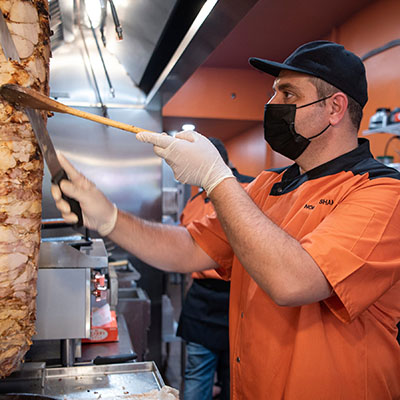Hannan Adely for NorthJersey.com
PATERSON — When they came to the United States four years ago as refugees from Syria, fleeing a brutal civil war, the three men were penniless and knew no English.
Now they are on a different path as Paterson’s newest business owners. On Monday, the three men celebrated a ribbon-cutting at their restaurant called Nour Al-Sham, meaning Light of the Levant.
“We were afraid to come to America because it was a new country, but we live here and we love it so much,” said Samir Alkhawaldah, 42, using the English he has learned since arriving in the U.S. in 2016. “We find a kindness here. The people are wonderful.”
Alkhawaldah opened the restaurant with Mohammad Hlal and Diyaa Khatib at 1136 Main St., where they specialize in Syrian food, especially shawarma, made by carving seasoned meat from a spit for sandwiches.
Nour Al-Sham is the newest Middle Eastern restaurant in a thriving stretch of South Paterson that has welcomed Arab immigrants for generations. The area is also home to grocery stores, professional offices, jewelers and other Arab-owned establishments, some with signs in Arabic and English.
Like these restaurant partners, many came as refugees, making harrowing and difficult journeys before settling in the U.S. and finding success here.
The three men are from the city of Daraa, which was hit hard at the start of the civil war that broke out in March 2011. Responding to protests, military forces rolled in and the city was bombarded by shootings, shelling and other violence. Protesters and dissidents were detained and tortured.
The men fled to Jordan and, after a years-long screening process, were accepted into the U.S. refugee program. Alkhawaldah and Hlal knew each other beforehand, but all arrived separately with their families and found one another in Paterson’s refugee community.
They struggled with the high cost of living and poor housing conditions, but people they met along the way helped them. The Reformed Church of Highland Park helped Khatib get a driver’s license, identification and a car. He moved from Middlesex County to Paterson, he said, because of the large Arabic community where he has made friends.
A former carpenter in Syria, he will act as a manager at the eatery, he said. His partners, who worked in the restaurant business in Syria, are the chefs.
“We are so happy,” said Khatib, 34 and a father of three. “This is my dream.”
They found work, took English classes and saved what they could to open the restaurant.
“Thank you for the people in America,” said Hlal, who is 38 and a father of four.
“They showed me how to go to the library, how to go shopping, where is the bus stop. It was very hard for me but everybody started to help from the first day I arrived here.”
Paterson has long been a stop for immigrant families, including Syrians who came starting in the late 1800s and worked in the textile mills that lined the Passaic River.
Syrians also came in large numbers after March 2011, when pro-reform protests broke out and President Bashar Assad responded with a harsh military crackdown. The conflict escalated into a civil war that has killed nearly 585,000 people, according to the Syrian Observatory for Human Rights. Another 6.6 million fled the country, according to the United Nations.
Numbers plummeted following executive orders by President Donald Trump banning most immigrants from Syria and slashing refugee resettlement.
Paterson Mayor Andre Sayegh said at the ribbon-cutting ceremony that the men had worked hard, saved money and realized their dream. He noted, too, that he is the son of Arab immigrants: a Syrian mother and a Lebanese father.
“It warms my heart to see these individuals are able to succeed in this country and this section of the city which has always welcomed immigrants,” he said.
Sikander Khan, executive director of Global Emergency Response and Assistance, a refugee service organization that helped the men and their families, said their success counters a negative narrative about refugees.
“We heard that refugees are a burden on our system here and they rely on welfare and they are a threat to our national security. Today, the story speaks for itself,” said Khan, noting that they are hiring staff from Paterson.
Asked how he felt about his new business, Hlal smiled.
“I don’t feel I’m a refugee any more here,” he said. “I feel I am from the United States … We are in this community now.”
